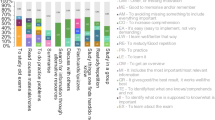Abstract
The process of learning with understanding was investigated by case study of three male students learning genetics at a tertiary college. Five conclusions regarding the process arise from the study. These conclusions are: (1) Learning outcome is determined by decisions made by the learner. These decisions are influenced by learner perceptions and interpretations. (2) Inadequate learning is due to ineffective decision-making. This ineffective decision-making is associated with specific, recurring learning deficiencies. The main types of deficiency, deficient processing tendencies and misconceptions, cause inadequate performance and preclude learning with understanding. A total of seven tendencies was observed. Each learner applied tendencies idiosyncratically. Tendencies also generated particular misconceptions which further inhibited learning. (3) It takes energy to learn with understanding, or to unlearn a misconception. (4) Learners often are unaware of their deficiencies. This lack of awareness generates inappropriate attitudes. (5) Increased learner awareness of the nature and process of learning changes attitudes and procedures. The major implication of this study relates to promoting self-control of learning. It is proposed that improved learning will result from increasing learner awareness of the nature and process of learning, and by training learners in procedures for enhancing self-evaluation and decision-making.
Similar content being viewed by others
References
Anderson, J. R. and Bower, G. H. (1973). Human Associative Memory. Washington, D.C.: V. H. Winston.
Atkinson, R. C. and Shiffrin, R. M. (1968). “Human memory: a proposed system and its control processes” in K. W. Spence and J. T. Spence (eds.), The Psychology of Learning and Motivation: Advances in Research and Theory, Vol. 2. New York: Academic Press.
Ausubel, D. (1968). Educational Psychology: A Cognitive View. New York: Holt, Rinehart and Winston.
Baird, J. R. (1980). Qualitative Differences in Learning Processes and Outcomes for an Intellectual Skill in Biology. Unpublished M.Ed. thesis, Monash University.
Baird, J. R. and White, R. T., in press. “A case study of learning styles in biology,” European Journal of Science Education.
Biggs, J. (1979). “Individual differences in study processes and the quality of learning outcomes,” Higher Education 8: 381–394.
Bobrow, D. G. and Norman, D. A. (1975). “Some principles of memory schemata,” in D. G. Bobrow and A. Collins (eds.), Representation and Understanding: Studies in Cognitive Science. New York: Academic Press.
Broudy, H. S. (1979). “The brightest and the best,” Phi Delta Kappan 60: 640–644.
Brumby, M. (1981). “Learning, understanding and ‘thinking about’ the concept of life,” Australian Science Teachers' Journal 27: 21–25.
Bruner, J. S. (1961). “The act of discovery,” Harvard Educational Review 31: 21–32.
Craik, F. I. M. and Lockhart, R. S. (1972). “Levels of processing: a framework for memory research,” Journal of Verbal Learning and Verbal Behaviour 11: 671–684.
Deese, J. (1962). “On the structure of associative meaning,” Psychological Review 69: 161–175.
Gagné, R. M. (1965). The Conditions of Learning. New York: Holt, Rinehart and Winston.
Gagné, R. M. and White, R. T. (1978). “Memory structures and learning outcomes,” Review of Educational Research 48: 187–222.
Glaser, B. G. and Strauss, A. L. (1967). The Discovery of Grounded Theory. Chicago: Aldine.
Kintsch, W. and Van Dijk, T. A. (1978). “Toward a model of text comprehension and production,” Psychological Review 85: 363–394.
Kuhn, T. S. (1962). Structure of Scientific Revolutions. Chicago: University of Chicago Press.
Laurillard, D. (1979). “The processes of student learning,” Higher Education 8: 395–409.
Marton, F. and Säljö, R. (1976a). “On qualitative differences in learning: I — Outcome and process,” British Journal of Educational Psychology 46: 4–11.
Marton, F. and Säljö, R. (1976b). “On qualitative differences in learning: II — Outcome as a function of the learner's conception of the task,” British Journal of Educational Psychology 46: 115–127.
Marton, F. and Svensson, L. (1979). “Conceptions of research in student learning,” Higher Education 8: 471–486.
Mayer, R. E. (1975). “Forward transfer of different reading strategies evoked by testlike events in mathematics text,” Journal of Educational Psychology 67: 165–169.
Paivio, A. (1971). Imagery and Verbal Processes. New York: Holt, Rinehart and Winston.
Piaget, J. (1963). The Origins of Intelligence in Children. New York: Norton.
Ramsden, P. (1979). “Student learning and perceptions of the academic environment,” Higher Education 8: 411–427.
Rickman, H. P. (1967). Understanding and the Human Studies. London: Heinemann.
Rumelhart, D. (1977). Introduction to Human Information Processing. New York: Wiley.
Schank, R. C. and Abelson, R. P. (1977). Scripts, Plans, Goals, and Understanding: An Inquiry into Human Knowledge Structures. Hillsdale, NJ: Erlbaum Associates.
Shavelson, R. J. (1972). ”Some aspects of the correspondence between content structure and cognitive structure in physics instruction,” Journal of Educational Psychology 63: 225–234.
Strike, K. A. and Posner, G. J. (1976). “Epistemological perspectives on conceptions of curriculum organisation and learning,” Review of Research in Education 4: 106–141.
Tulving, E. (1972). “Episodic and semantic memory,” in E. W. Tulving and W. Donaldson (eds.), Organisation of Memory. New York: Academic Press.
White, R. T. and Mayer, R. E. (1980). “Understanding intellectual skills,” Instructional Science 9: 101–127.
Wittrock, M. C. (1974). “Learning as a generative process,” Educational Psychologist 11: 87–95.
Author information
Authors and Affiliations
Rights and permissions
About this article
Cite this article
Baird, J.R., White, R.T. Promoting self-control of learning. Instr Sci 11, 227–247 (1982). https://doi.org/10.1007/BF00414281
Issue Date:
DOI: https://doi.org/10.1007/BF00414281




